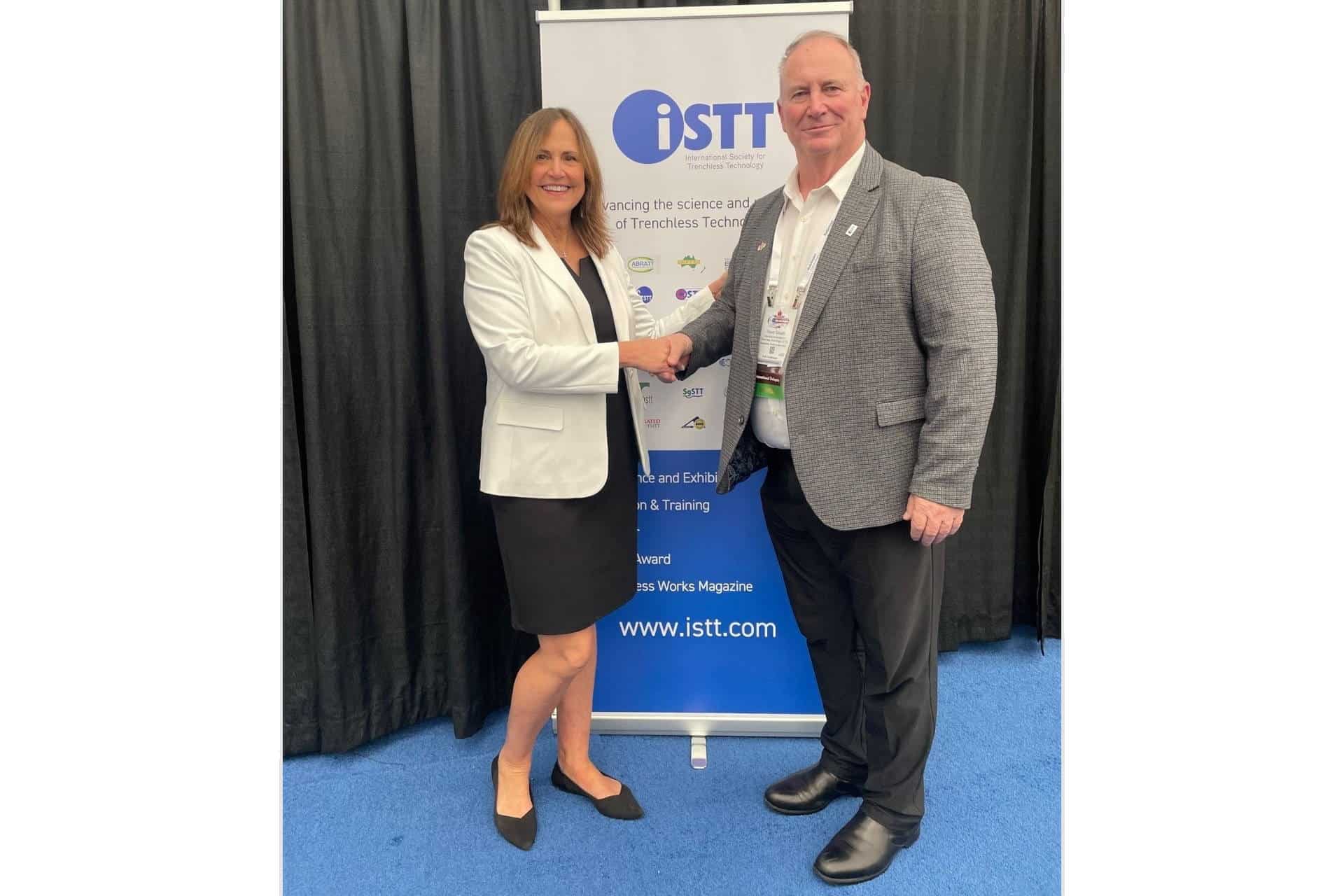Naylor Industries Plc. U.K.-Based Clay Pipe Manufacturer Continues Success After 115 Years
Who knew in 1890 that the company would one day manufacture more than 2.5million meters of clay pipe in a single year, with between 15 to 20 percent ofits clayware sent overseas? Who could have envisioned that this family businesswould yield in excess of 25 million GBP ($45 million USD) in revenue annually?
Naylor Industries has done all that and more since 1890 — with its leadersand developing even better and stronger products for its customers and newmarkets to introduce its pipe. Today, this pioneering trenchless company employsmore than 250 people at its manufacturing facilities and offices.
Company officials entered the trenchless marketplace 21 years ago when askedif they could make a pipe that can be pushed into the ground — one of the firstcompanies in the United Kingdom to do so. After deciding it was something worthpursuing, Naylor created its own vitrified clay pipe — its DENLOK line — forpipe bursting and later for pipe jacking and microtunneling applicationsinvolving gravity lines. Today, trenchless operations account for half of itsannual revenue — and averages 18 km of jacking pipe a year.
Loyalty is twofold at Naylor. Many employees are long tenured and invaluable,such as Granville Bull, managing director, who started with Naylor in 1962 andduring his 40-plus years developed its exporting operation. Naylor also enjoyscustomer loyalty, respecting and appreciating its longtime customers.
“We are fleet of foot because we’ve been around a lot of years and we’ve gotsome very good people with considerable expertise,” says Naylor CEO EdwardNaylor, becoming the fourth generation to run the company. “Everyone isencouraged to come up with ideas. We are prepared to try our hand at new things.It’s a combination of longevity, expertise and a sort of ‘can do’ culture wefoster… We like to look after people and we like people to stick around. Sothere is a sort of paternalistic side to the business.”
History
Naylor Industries Plc. is locatedin Barnsley, Yorkshire, United Kingdom, which has served as home for the companysince its inception. Naylor Industries Plc. is a company that is steeped infamily and tradition — something that Edward Naylor, doesn’t see changinganytime soon.
Established as a clay pipe manufacturer in 1890, the company has known noother name and clay pipe has been its foundation. Now 115 years later, a fourthgeneration of Naylor heads the company, a synergy that Edward Naylor is proud tobuild on.
Though its long and storied history begins with clay pipe, today’s companyfeatures a diversity that lends itself to long-term stability. Over the years,Naylor Industries has grown into two subsidiaries: Naylor Drainage Ltd., whichfocuses on its trenchless division, and Naylor Concrete Products Ltd.
As the company has successfully expanded over the years into different areas,such as concrete and plastic, the one constant has been its continuedmanufacture of clay pipes. From this foundation, Naylor’s activities havesteadily expanded over time to include fittings and couplings, with interestsacross a broad spectrum of the building and construction industries.
Leading the family business wasn’t something that Edward Naylor expected tobe pursuing in his professional life. He came to the helm of Naylor Industriesin 1994, taking over the company’s reins after the unexpected death of hisfather, Allan Naylor. Before that, he worked as an accountant in London. Butonce in charge, he knew only one way to go — forward.
Not one to rest on reputation or laurels, Naylor knew the key to thecontinued vitality of the company was to invest in itself to produce a betterand stronger product to compete in the competitive, global marketplace. Naylorappreciates his employees and what they bring to the table as far as expertiseand commitment to the success of the company. He values their opinions on how tomake Naylor products better and understands the importance of investing in thecompany’s future by continually updating its technology in the factory and inthe offices. All of these points have been important to the company’s success.It’s an attitude shared by his fellow management leaders, such as Bull and SimonMarsh, DENLOK product manager, who has been with Naylor Industries since1993.
Using the philosophy “Modernize or get out,” Naylor spent huge amounts ofmoney on capital investment between 1994 and 2004 — investing 10 to 15 millionGBP ($18 to 27 million USD) on its plants and offices.
“There has been [a lot of money] spent on information technology,” Naylorsays. “We have systematically gone through every kiln that we have and replacedit with something more modern, more computer-controlled, more thermal efficient.We’ve invested in high-specification robotics so some of the fittings we makeare wholly automated and manufactured using robots…We believe in having thestate-of-the-art equipment in both the plants and the offices to enable us to beworld-leading in our fields.”
But Naylor points to another factor in the company’s ongoing success: Thefact that it is a family-owned business. He says that not being beholden to theups and downs of the stock market for any year’s profitability and dividendsallows the company to make long-term decisions concerning its product line andnot be so concerned with how long it takes to develop ideas.
“One of our strengths is that despite being over 100 years old, we are stilla family business,” Naylor says. “This generation is just me but we are still afourth-generation family business. I think that gives you the luxury of doingthings for the long-term.”
He uses the company’s foray into trenchless technology as an example of histhoughts.
“When we first started our venture in jacking pipe, it was really, ‘Can wemake a pipe for trenchless installations? We have no idea but we’ll make a go ofit,’” he continues. “So product development becomes something that we areprepared to take a long-term view on rather than being something that we doneeding a quick return and otherwise dump the idea.”
He notes that the company spent about 10 years and “an awful lot of moneyplaying around with the concept of a pipe for trenchless installation” beforecoming up with something commercially viable and capable of giving a financialreturn for the effort.
An early innovator for trenchless technology in the United Kingdom, Naylor isproud of its pioneering status. “We were involved in the very early stages [ofthe U.K. trenchless market] before really anybody had developed any machinery,any sort of site procedures,” he says, adding Naylor participated in the firstNo-Dig conference in 1985 in the United Kingdom.
Today, its DENLOK line — produced from Naylor Drainage Plc. — is a speciallydeveloped vitrified clay pipe system that is used for trenchless constructionmethods, including microtunneling, guided auger boring, pipe bursting andsliplining. Its sizes range in diameter from 150 to 700 mm and has lengths from0.5 to 2 m. Naylor Drainage also developed a pipe for trenchless use for thechemical and processing industries, where there is high-corrosion resistancerequired for the effluent that carries through the pipes (i.e. for thepetro-chemical and food industries).
Company officials say vitrified clay pipe is ideally suited for trenchlessapplications (gravity, not pressure pipe), due to its strength andsmoothness.
“I think for diameters up to 700 and 800 mm, clay is the obvious choicebecause it performs well, it can be transported quite economically worldwide andit has much better strength characteristics than concrete or polymer concrete,”Bull says.
Its customers can be found all over the world, although initially that wasn’tthe plan when developing its trenchless pipe. “When we actually started makingpipe for trenchless technology, we were aiming at the U.K. market, with theexpressed intention of it being used in pipe bursting,” says Bull. “As you canappreciate, the U.K. has a lot of old sewers, dating back 100 years or so. Therewas a huge plan to renovate them but by coincidence, there was a change in theactual structure of the water authority and these became privatized watercompanies that spent their money and effort on many things except sewerrenovation. So consequently, the actual pipe bursting activity, while quitesuccessful, was relatively spasmodic and short-lived [at the time].”
It was at that juncture that Naylor Industries decided to look overseas tosell its product, slightly modifying it to take advantage of opportunities formicrotunneling in the Middle East and Southeast Asia. Sales today span allthrough Europe, the Middle East, Australasia and Southeast Asia, as well as theUnited Kingdom. The company also has a cooperation agreement with U.S.-basedCan-Clay Corp. Cannelton, Ind., which sells its product in that country.
“Historically, our strongest markets have been Southeast Asia andAustralasia,” Naylor says. “Continental Europe has become an increasinglyimportant part of our business… We’ve been exporting into old Eastern Europe andwe’ve had good business over the last 12 months in the Czech Republic andPoland. Eastern Europe has become an important part of our business now where ithad not been in the past.”
Evolution
As technology has improvedover the years, so has the Naylor product — perhaps not in its outwardappearance but in structure and quality. “I think there is a constantevolution,” Naylor says. “It’s a product that we constantly develop and evolve.We’ve improved our joints. We’ve put in a packing ring to act as a buffer toavoid end-on-end impact…I think it’s still recognizable from where we startedout, but it is a product that has gotten better and better as time has goneby.”
Naylor pipe has also found new applications, such as a specially made ceramicpipe — DenChem — for a trenchless product in very aggressive ground conditionsin South Africa. This earned Naylor Drainage an innovative product award fromthe United Kingdom Society of Trenchless Technology in 2004.
Product evolution is not just left to an R&D department. The opinions andthoughts of its employees and suppliers come into play. “As a company, weoperate under the philosophy of supply chain management,” Marsh says. “If we asa company cannot find the answer, we can turn to our suppliers who we work veryclosely with to try to improve our basic product, i.e. the seals, the polymersin the couplings, etc…We are forever trying to improve the product.”
Always looking for the next big thing, Naylor says critical to the company’sfuture riches lie in opening new markets for its products. “It think thatopening new markets is key and those new markets will be both in Europe andfurther afield,” Naylor says. “I think that continuing to develop new product isimportant to us. We are very interested in the field of chemical resistance andhigh-performance ceramic pipe and that’s part of our business that we’llcontinue to expand.”




